考研英语翻译讲座第1讲
- 格式:ppt
- 大小:274.50 KB
- 文档页数:20
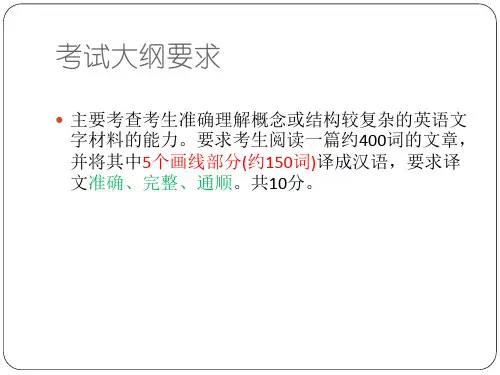
![博士研究生英语精读教材翻译1-3课(中科院)[整理版]](https://uimg.taocdn.com/fdde77197dd184254b35eefdc8d376eeaeaa17b1.webp)
第1课知识的悖论The Paradox of Knowledge人类从古类人猿进化到当前的状态这个长久的进化过程中的最大成就是有关于人类自身、世界以及宇宙众多知识的获得和积聚。
这些知识的产物就是那些我们总称为“文化”的所有的东西,包括语言、科学、文学、艺术、所有的物质机器、仪器、我们所用的结构以及社会所依赖的物质基础设施。
我们之中大多数人认为现代社会中各种知识在不断增长,与此同时社会或群体对新知识的积累也在稳步减少我们对人类自身、世界及宇宙的未知。
然而,现有的无垠的未知领域在不断提示着我们需要批判性地分析这个设想。
普遍的观点认为,智力的演变与身体的发育相似,虽然要快上许多。
生物的进化经常被描述为“个体的进化重演物种的进化”,意思就是个体的胚胎在其从受精卵发展到人类胎儿的过程中经历了几个阶段,在这些阶段中个体胚胎类似人类物种的祖先形式。
普遍的观点认为人类从天真无邪的状态进步的,这个状态可以比作婴儿,然后逐渐的获得越来越多的知识,就像一个小孩通过学习通过了教育体系的几个年级一样。
这种观点中暗含着一种臆断,那就是种系发育类似个体发育,知识的积累最终能达到一个基本完整的阶段,至少在特定的领域中是如此,就好像社会已获得了所有的高等学位,这些学位表明它已经掌握了各个重要学科的知识。
实际上,一些杰出的科学家已经表达了这样的观点。
1894年伟大的物理学家Albert Michelson在芝加哥大学的一个演讲中讲到:虽然不能断言未来的物理学不会再取得比过去更惊人的成就,但很可能大多数的重要的基本原理都已经牢固的确立了,那么,进一步的发展将可能主要是如何将这些基本原理精确地应用到我们注意的现象上去。
人们很难在物理学领域再作突破。
在迈克尔逊讲述上一段话之后的一个世纪,科学家们在物理学上的发现远远超出了对小数点第六位测量的改进,而今天没有人会再进行与Michelson相似的阐述。
但是仍有许多人坚持认为知识有迟早达到穷尽的可能性。
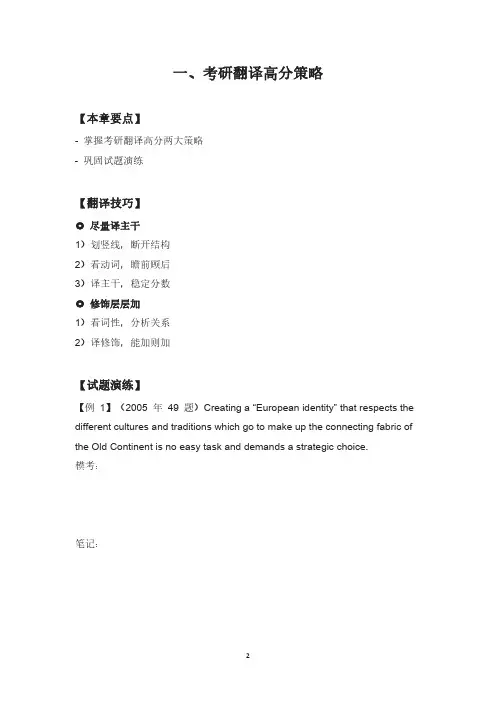
一、考研翻译高分策略【本章要点】-掌握考研翻译高分两大策略-巩固试题演练【翻译技巧】◎尽量译主干1)划竖线,断开结构2)看动词,瞻前顾后3)译主干,稳定分数◎修饰层层加1)看词性,分析关系2)译修饰,能加则加【试题演练】【例1】(2005年49题)Creating a“European identity”that respects the different cultures and traditions which go to make up the connecting fabric of the Old Continent is no easy task and demands a strategic choice.模考:笔记:【例2】(2008年47题)He asserted,also,that his power to follow a long and purely abstract train of thought was very limited,for which reason he felt certain that he never could have succeeded with mathematics.模考:笔记:【例3】(2008年49题)He adds humbly that perhaps he was“superior to the common run of men in noticing things which easily escape attention,and in observing them carefully.”模考:笔记:本章参考译文【例1】不同的文化和传统把欧洲大陆编织在一起,要创造出一种尊重这些不同文化和传统的“欧洲品牌”绝非易事,需要人们做出战略性的选择。
【例2】他还坚持认为自己进行长时间完全抽象思维的能力十分有限,由此他认定自己在数学方面根本不可能有大的作为。
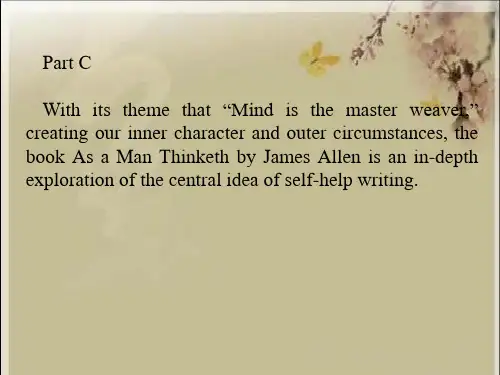
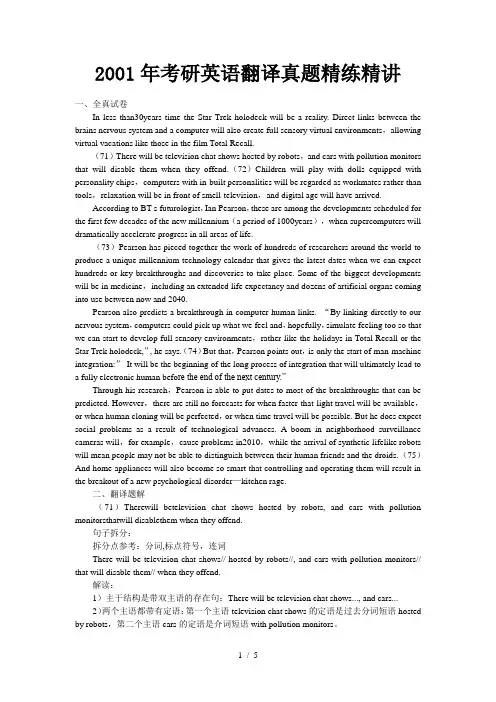
2001年考研英语翻译真题精练精讲一、全真试卷In less than30years time the Star Trek holodeck will be a reality. Direct links between the brains nervous system and a computer will also create full sensory virtual environments,allowing virtual vacations like those in the film Total Recall.(71)There will be television chat shows hosted by robots,and cars with pollution monitors that will disable them when they offend.(72)Children will play with dolls equipped with personality chips,computers with in-built personalities will be regarded as workmates rather than tools,relaxation will be in front of smell-television,and digital age will have arrived.According to BT s futurologist,Ian Pearson,these are among the developments scheduled for the first few decades of the new millennium(a period of 1000years),when supercomputers will dramatically accelerate progress in all areas of life.(73)Pearson has pieced together the work of hundreds of researchers around the world to produce a unique millennium technology calendar that gives the latest dates when we can expect hundreds or key breakthroughs and discoveries to take place. Some of the biggest developments will be in medicine,including an extended life expectancy and dozens of artificial organs coming into use between now and 2040.Pearson also predicts a breakthrough in computer-human links. “By linking directly to our nervous system,computers could pick up what we feel and,hopefully,simulate feeling too so that we can start to develop full sensory environments,rather like the holidays in Total Recall or the Star Trek holodeck,”, he says.(74)But that,Pearson points out,is only the start of man-machine integration:”It will be the beginning of the long process of integration that will ultimately lead to a fully electronic human befo re the end of the next century.”Through his research,Pearson is able to put dates to most of the breakthroughs that can be predicted. However,there are still no forecasts for when faster-that-light travel will be available,or when human cloning will be perfected,or when time travel will be possible. But he does expect social problems as a result of technological advances. A boom in neighborhood surveillance cameras will,for example,cause problems in2010,while the arrival of synthetic lifelike robots will mean people may not be able to distinguish between their human friends and the droids.(75)And home appliances will also become so smart that controlling and operating them will result in the breakout of a new psychological disorder—kitchen rage.二、翻译题解(71)Therewill betelevision chat shows hosted by robots, and cars with pollution monitorsthatwill disablethem when they offend.句子拆分:拆分点参考:分词,标点符号,连词There will be television chat shows// hosted by robots//, and cars with pollution monitors// that will disable them// when they offend.解读:1)主干结构是带双主语的存在句:There will be television chat shows..., and cars...2)两个主语都带有定语:第一个主语television chat shows的定语是过去分词短语hosted by robots,第二个主语cars的定语是介词短语with pollution monitors。
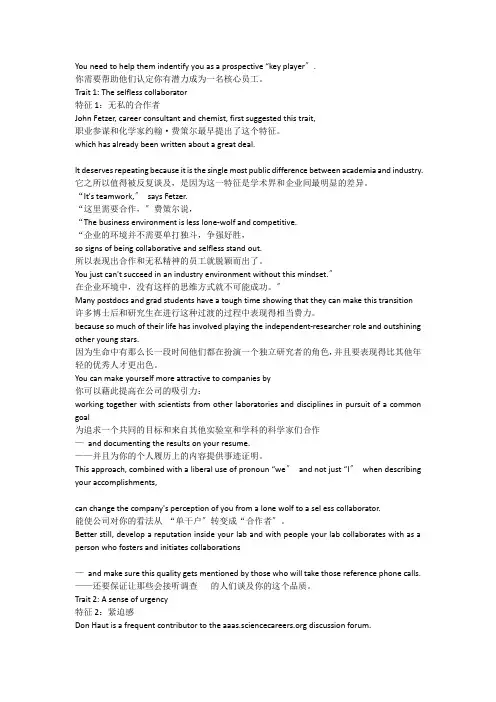
You need to help them indentify you as a prospective “key player〞.你需要帮助他们认定你有潜力成为一名核心员工。
Trait 1: The selfless collaborator特征1:无私的合作者John Fetzer, career consultant and chemist, first suggested this trait,职业参谋和化学家约翰·费策尔最早提出了这个特征。
which has already been written about a great deal.It deserves repeating because it is the single most public difference between academia and industry.它之所以值得被反复谈及,是因为这一特征是学术界和企业间最明显的差异。
“It's teamwork,〞says Fetzer.“这里需要合作,〞费策尔说,“The business environment is less lone-wolf and competitive.“企业的环境并不需要单打独斗,争强好胜,so signs of being collaborative and selfless stand out.所以表现出合作和无私精神的员工就脱颖而出了。
You just can't succeed in an industry environment without this mindset.〞在企业环境中,没有这样的思维方式就不可能成功。
〞Many postdocs and grad students have a tough time showing that they can make this transition许多博士后和研究生在进行这种过渡的过程中表现得相当费力。
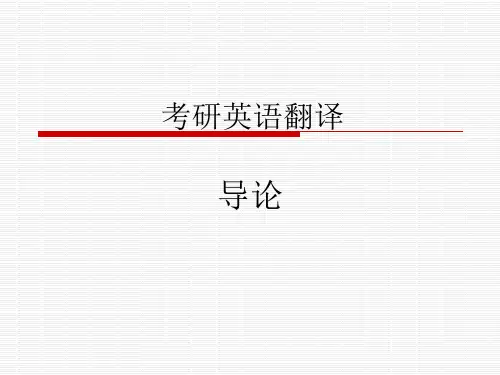
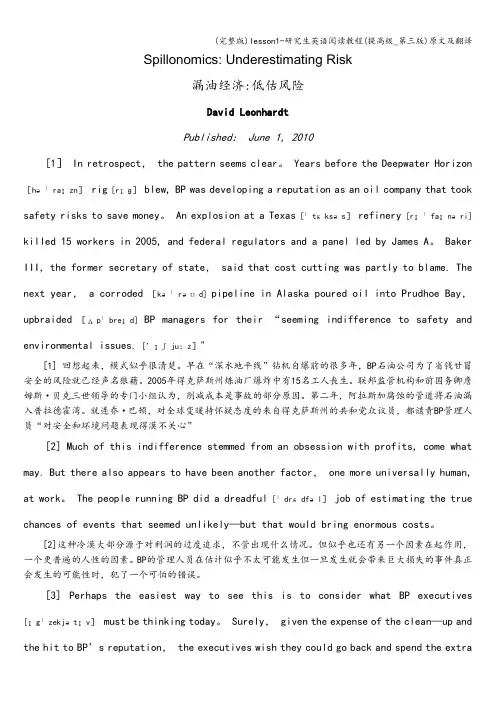
Spillonomics: Underestimating Risk漏油经济:低估风险David LeonhardtPublished: June 1, 2010[1] In retrospect, the pattern seems clear。
Years before the Deepwater Horizon [həˈraɪzn] rig[rɪɡ]blew, BP was developing a reputation as an oil company that took safety risks to save money。
An explosion at a Texas [ˈtɛksəs]refinery [rɪˈfaɪnəri] killed 15 workers in 2005, and federal regulators and a panel led by James A。
Baker III, the former secretary of state, said that cost cutting was partly to blame. The next year, a corroded [kəˈrəʊd] pipeline in Alaska poured oil into Prudhoe Bay,upbraided[ʌpˈbreɪd] BP managers for their “seeming indifference to safety and environmental issues. [’ɪʃju:z]"[1] 回想起来,模式似乎很清楚。
早在“深水地平线”钻机自爆前的很多年,BP石油公司为了省钱甘冒安全的风险就已经声名狼藉。
2005年得克萨斯州炼油厂爆炸中有15名工人丧生。
联邦监管机构和前国务卿詹姆斯·贝克三世领导的专门小组认为,削减成本是事故的部分原因。
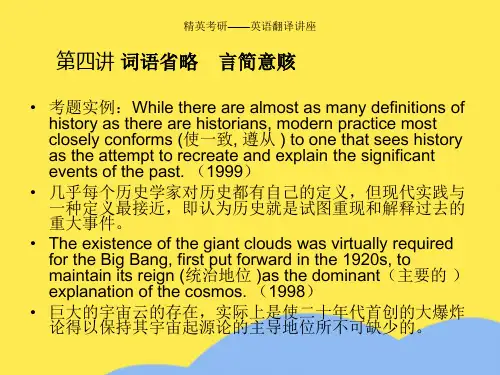
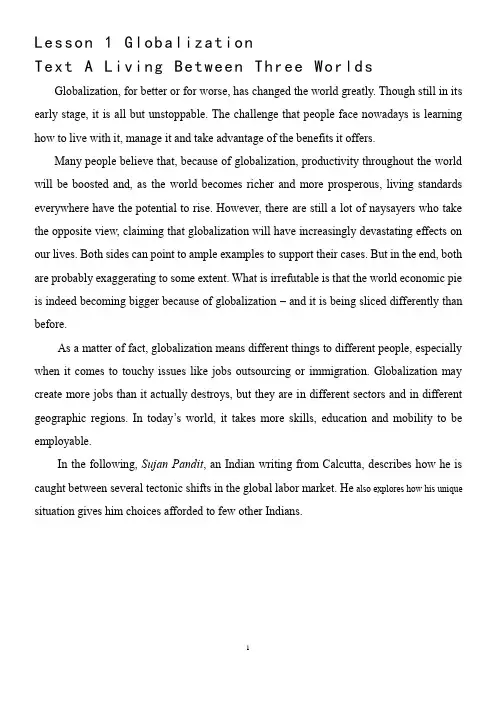
Lesson 1 GlobalizationText A Living Between Three Worlds Globalization, for better or for worse, has changed the world greatly. Though still in its early stage, it is all but unstoppable. The challenge that people face nowadays is learning how to live with it, manage it and take advantage of the benefits it offers.Many people believe that, because of globalization, productivity throughout the world will be boosted and, as the world becomes richer and more prosperous, living standards everywhere have the potential to rise. However, there are still a lot of naysayers who take the opposite view, claiming that globalization will have increasingly devastating effects on our lives. Both sides can point to ample examples to support their cases. But in the end, both are probably exaggerating to some extent. What is irrefutable is that the world economic pie is indeed becoming bigger because of globalization – and it is being sliced differently than before.As a matter of fact, globalization means different things to different people, especially when it comes to touchy issues like jobs outsourcing or immigration. Globalization may create more jobs than it actually destroys, but they are in different sectors and in different geographic regions. In today’s world, it takes more skills, education and mobility to be employable.In the following, Sujan Pandit, an Indian writing from Calcutta, describes how he is caught between several tectonic shifts in the global labor market. He also explores how his unique situation gives him choices afforded to few other Indians.My fate is not that of a corporate foot-soldier, which – as the television images and newspaper photographs would suggest – involves a life of labor in a little cell and in tandem with many other, equally industrious honey-bees, armed only with a workstation and telephone.My job in marketing and business development does not eschew face-to-face contact. The company I work for is a small one, but it is spaced over three time zones: in Dallas, New York and Calcutta.But what makes the company distinctive is that it is a post-modern firm, since such a firm could scarcely have existed ten years ago. It is what Manuel Castells – Professor of City and Regional Planning at the University of California, Berkeley – would have called a network company, held together through e-mails and teleconferences alone.Stepping out of the air-conditioned office, I am greeted with the hot, damp touch of a Calcutta dusk. I hailed a black and yellow boneshaker of a taxi and instruct the driver to head for my club.His is an old Ambassador car, a poor Morris Oxford imitation dating back to the 1950s and still unchanged – a veritable monument of the pre-globalization License Raj era.As the taxi makes its way through the hustle and bustle of Calcutta’s streets, the blaring music and garish film posters, dodging cows and errant rickshaw pullers, I meditate on the scene around me.What a contrast between the work I do and the lives they lead! What does globalization mean to these people? If globalization has to mean anything significant to the Indian poor, it must mean a transformation of their lives.And yet, I can bet 100 to one that their lives will differ in no significant way from their fathers’ or grandfathers’ before them. The only consolation I can offer myself is that my job makes me the avant-garde of a movement which may – over the course of this century – improve their great-grandchildren’s lives.Finally, the taxi reaches the club and an old Victorian clubhouse comes into view amidst the sprawling golf course, manicured lawns and tennis courts. I head for the tea-lounge.With its Daniels’ water-color prints, richly brocaded chairs, dark mahogany paneling and wooden parquetry, this is the place to enjoy coffee after work. A liveried waiter brings me some.The club itself is a product of that last great age of globalization, what Eric Hobsbawm called “The Age of Empire”. Now that we are in another age of globalization, little of the décor seems to have changed since then.Only then, as an Indian, I would not have been allowed to enter its hallowed portals. Perhaps some thing do change after all!Sipping my coffee, I ponder over the question that is being debated in England: “Import workers or export jobs?” The first thing that strikes me is that it presents a so very First World perspective.Sitting in a Third World country, the proposition could equally be phrased as: “Export workers – or import jobs?” Actually, whichever way you state it, the economist’s answer is the same and is very simple: it does not matter.As a graduate student of economics, I have imbibed the theorems of microeconomics almost with my mother’s milk. If we view the right to work and citizenship as a bundle of legal rights, then their free exchange will move resources to their highest valued use, thereby maximizing global output.Under such conditions, migration and outsourcing are two sides of the same coin, temporary disequilibrium conditions leading to an eventual equilibrium.An admirable goal? Indeed! Realizable? It will founder on the frailties of human nature. Equal real wages for equivalent work throughout the world is the most heart-warming as long as it doesn’t affect my own lifestyle. Equality is good so long that I am immune from its pressures.By a strange quirk of fate, I am condemned to view the problems of migration and outsourcing from both sides.As a child of an Indian father and English mother, I have Indian citizenship, but also a Right of Abode which allows me to work in the United Kingdom. At the same time, I am an applicant for a U.S. Green Card.Much of my high education occurred in the United States and I have worked in Indian , the U.K. and the United States. A real citizen of one country, I remain an imaginary citizen of two others.Trapped between three worlds, I feel justifiably proud at India’s success in outsourcing. Yet I am equally aware that as a potential migrant to the U.K. or the United States, the reduction in transaction costs that makes outsourcing possible has an infringing consequence: It also reduces the economic attractiveness of these two countries to me.Once we become members of an exclusive club ( like the one I am sitting in ), we would like all further applications stopped!It is this duality of human nature that makes me view the future of globalization with foreboding. Just as the last great age of globalization engendered uncontrolled jingoism and came crashing down amidst the mud and filth of Flanders’ fields, our age too has its weaknesses.Foremost among them is protectionism, which includes eliminating immigration. Equality of real wages of equivalent work is going to hit some people in the developed world really hard – and for reasons not of their own making.Before Industrial Revolution, poverty was equally distributed throughout the globe, and therefore global inequality was low.Certainly, great differences existed between king and peasant in all feudal societies, but the lot of peasant in India and Europe was fairly similar: a life at the margin.Then came the Industrial Revolution – and a few countries began to pull away from the rest. This secular separation has gone on for over two centuries now.It has reached a point where the average bachelor’ degree holder in India has to make do on a few dollars a day, while his U.S. counterpart with a similar educational level enjoys a three-bedroom house, even if both are doing the same work.The reason why this could go on was because, for the U.S. worker, the labor market he or she had to face was the local, or at best, the national market. The fall in transaction costs owing to globalization has meant that the relevant market for this worker is now the international one.This dramatic outward shift of the labor supply curve will naturally reduce his wages. At the same time, it reduces global inequality in remuneration for similar work. Both migration and outsourcing can be viewed as an attempt to arbitrage these existing wage differentials.This will certainly lead to a backlash, as is happening in the United States and Europe right now. Nor will it go away easily, not even with a return to economic prosperity.This is because of the fundamental contradiction that lies at the heart of the liberal political and economic order. The liberal economic order demands progression towards perfect competition, which ultimately devalues citizenship rights. On the other hand, the liberal political order is predicated by the concert of nation-states.We have, so far, no other bases for the establishment of democratic regimes —and the E.U. is still too immature and unloved to take its place that demands robust citizenship rights.The economic entrepreneur is expected follow the demands and needs of the consumers slavishly, but if the political entrepreneur —that is, the politician —were to follow this advice, a protectionist regime could easily emerge. After all, demand for protection is a natural reaction to declining or stagnant income levels.There is no easy way out of this dilemma and only a good dose of common-sense and self-restraint can alleviate matters.Complex thoughts. Weighty matters. And no resolution. Having finished my coffee, I take my leave from the tea-lounge and wait in the foyer for a taxi.As I scan the darkness outsides, I think of my lawyer back in Dallas and mutter, “When will my Green Card come?”。
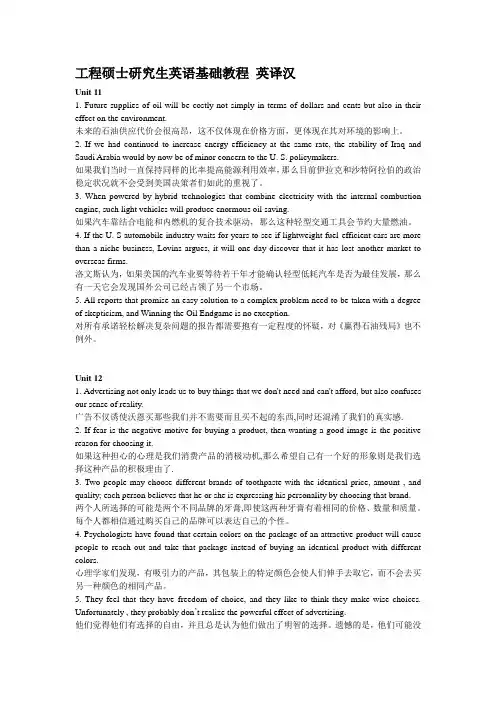
工程硕士研究生英语基础教程英译汉Unit 111. Future-supplies of oil will be costly not simply in terms of dollars and cents but also in their effect on the environment.未来的石油供应代价会很高昂,这不仅体现在价格方面,更体现在其对环境的影响上。
2. If we had continued to increase energy efficiency at the same rate, the stability of Iraq and Saudi Arabia would by now be of minor concern to the U. S. policymakers.如果我们当时一直保持同样的比率提高能源利用效率,那么目前伊拉克和沙特阿拉伯的政治稳定状况就不会受到美国决策者们如此的重视了。
3. When powered by hybrid technologies that combine electricity with the internal-combustion engine, such light vehicles will produce enormous oil saving.如果汽车靠结合电能和内燃机的复合技术驱动,那么这种轻型交通工具会节约大量燃油。
4. If the U. S automobile industry waits for years to see if lightweight fuel-efficient cars are more than a niche business, Lovins argues, it will one day discover that it has lost another market to overseas firms.洛文斯认为,如果美国的汽车业要等待若干年才能确认轻型低耗汽车是否为最佳发展,那么有一天它会发现国外公司已经占领了另一个市场。
UNIT11. Recently, one of us had the opportunity to speak with a medical student about a research rotation that the student was planning to do. She would be working with Dr. Z, who had given her the project of writing a paper for which he had designed the protocol, collected the data, and compiled the results. The student was to do a literature search and write the first draft of the manuscript. For this she would become first author on the final publication. When concerns were raised about the proposed project, Dr. Z was shocked. "l thought I was doing her a favor," he said innocently, "and besides, I hate writing!"2. Dr. Z is perhaps a bit naive. Certainly, most researchers would know that the student's work would not merit first authorship. They would know that "gift" authorship is not an acceptable research practice. However, an earlier experience in our work makes us wonder. Several years ago, in conjunction with the grant from the Fund for the Improvement of Pott Secondary Education (FIPSE), a team of philosophers and scientists at Dartmouth College 2 ran a University Seminar series for faculty on the topic "Ethical Issues in scientific Research."At one seminar, a senior researcher (let's call him Professor R) argued a similar position to that of Dr. Z. In this case Professor R knew that "gift" authorship, authorship without a significant research contribution, was an unacceptable research practice. However, he had a reason to give authorship to his student.The student had worked for several years on a project suggested by him and the project had yielded to publishable data. Believing that he had a duty to the student to ensure a publication, Professor R had given the student some data that he himself had collected and told the student to write it up. The student had worked hard, he said, albeit on another project, and the student would do the writing. Thus, he reasoned, the authorship was not a "gift."3. These two stories point up a major reason for encouraging courses in research ethics: Good intentions do not necessarily result in ethical decisions. Both of the faculty members in the above scenarios "meant well." In both cases, the faculty members truly believed that what they were doing was morally acceptable. In the first case, Dr. Z's indefensible error was that he was unaware of the conventions of the field.In particular, he seemed blissfully oblivious to the meaning of first authorship. In the second case, Professor R was do ng what he thought best for the student without taking into consideration that moral. ty is a public system and that his actions with regard to a single student have public consequences for the practice of science as a profession.4. Well-meaning scientists, such as those just mentioned, can, with the best of intentions, make unethical decisions. In some cases, such decisions may lead individuals to become embroiled in cases of 1. 最近,我们当中的一员有机会与一名医科学生谈论她正计划要做的一个实验室轮转项目。
新东方在线考研翻译基础班讲义主讲:唐静课程简介以讲解翻译基础知识为主,基本不涉及考研翻译的真题。
但是,真题很重要,有必要在强化训练中完全掌握真题。
课程大纲第一章考研翻译基础知识一翻译的定义二翻译的标准和翻译的方法三翻译的基本过程四考研翻译的核心解题策略第二章翻译技巧:词法翻译法一词义选择和词义引申二词性转换三增词法四省略法第三章翻译技巧:句法翻译法一名词性从句的翻译二定语从句的翻译三状语从句的翻译四被动结构的翻译第一讲翻译的定义翻译是一门语言的艺术,是语言之间的转换,是在准确理解的基础上用一种语言来忠实的表达另外一种语言。
考研翻译简介(一)考研翻译考查内容和形式根据全国硕士研究生统一考试英语考试大纲规定,考研翻译“主要考查考生准确理解内容或结构复杂的英语材料的能力。
要求考生阅读一篇约400词的文章,并将其中5个划线部分(约150词)译成汉语,要求译文准确、完整、通顺。
考生在答题卡2上作答。
”以2007年考研翻译题为例,考生在试卷上阅读的是一篇完整的文章,翻译的是5个划线部分。
如:Part CT ranslation:Directions:Read the following text carefully and then translate the underlined segments into Chinese. Y our translation should be written clearly on ANSWER SHEET2. (10 Points)The study of law has been recognized for centuries as a basic intellectual discipline inEuropean universities. However, only in recent years has it become a feature of undergraduate programs in Canadian universities. 46)Traditionally, legal learning has been viewed in such institutions as the special preserve of lawyers, rather than a necessary part of the intellectual equipment of an educated person. Happily, the older and more continental view of legal education is establishing itself in a number of Canadian universities and some have even begun to offer undergraduate degrees in law.If the study of law is beginning to establish itself as part and parcel of a general education, its aims and methods should appeal directly to journalism educators. Law is a discipline which encourages responsible judgment. On the one hand, it provides opportunities to analyze such ideas as justice, democracy and freedom. 47) On the other, it links these concepts to everyday realities in a manner which is parallel to the links journalists forge on a daily basis as they cover and comment on the news. For example, notions of evidence and fact, of basic rights and public interest are at work in the process of journalistic judgment and production just as in courts of law. Sharpening judgment by absorbing and reflecting on law is a desirable component of a journalist's intellectual preparation for his or her career.48) But the idea that the journalist must understand the law more profoundly than an ordinary citizen rests on an understanding of the established conventions and special responsibilities of the new media.Politics or, more broadly, the functioning of the state, is a major subject for journalists. The better informed they are about the way the state works, the better their reporting will be. 49) In fact, it is difficult to see how journalists who do not have a clear grasp of the basic features of the Canadian Constitution can do a competent job on political stories.Furthermore, the legal system and the events which occur within it are primary subjects for journalists. While the quality of legal journalism varies greatly, there is an undue reliance amongst many journalists on interpretations supplied to them by lawyers. 50) While comment and reaction from lawyers may enhance stories, it is preferable for journalists to rely on their own notions of significance and make their own judgments. These can only come from a well-grounded understanding of the legal system(二)考研翻译的评分标准根据大纲规定,考研翻译的评分标准如下:5个小题,每题2分,共10分。
sentence=410|3.944|How do your current designs and your current collections4|7.944|fit in with your manifesto or are they two separate entities?您当前的设计和当前的收藏如何适合你的宣言,还是两个独立的实体?8|18.347|My manifesto applies to my gold label but it applies particularly to "World's x18.36|21.100|That's the shot where I did punk rock and everything我的宣言适用于我的黄金标签,但特别适用于“世界末日”,因为我想。
这是我做朋克摇滚和一切的镜头21.109|25.347|and I thought what would I tell young people these days and I wanted to activate it.我想我今天会告诉年轻人,我想激活它25.482|29.256|I wanted to get a great look in there that was cheap enough to buy 我想在那里买东西很便宜,29.266|32.656|and yet you looked great good quality all this stuff但是你看起来很好,所有这些东西都很好32.682|37.656|and put also lots of my old favourites in there that never will date 还把我那些从来不会约会的很多我最喜欢的东西放在这里37.682|40.956|and you can just wear them forever and get a real look in there.你可以永远穿着它们,并在那里得到一个真正的外观。
详解新视角研究生英语读说写1课文原文加翻译及课后答案1. 课文原文下面是《新视角研究生英语读说写1》的第一课的课文原文:Community Colleges and Technical Institutes Nowadays, community colleges and technical instit utes are becoming increasingly important in the U nited States. They offer a wide range of educatio nal courses and programs for students who want to gain new knowledge and skills without having to attend a traditional four-year university. These institutions are usually more affordable and acce ssible, making education more available to a dive rse group of people.Community colleges focus on providing students wi th the basic foundational courses to prepare them for further studies or entry-level jobs in vario us industries. They typically offer associate deg rees, which are two-year degree programs. Student s can earn an associate degree and then transfer to a four-year institution to complete their bach elor's degree.Technical institutes, on the other hand, are spec ialized schools that focus on teaching specific t echnical skills. They provide hands-on training and practical experience in areas such as technolo gy, healthcare, and trades. Students who attend t echnical institutes typically receive a certifica te or diploma upon completion of their program, w hich allows them to directly enter the workforce. Overall, community colleges and technical institu tes play an important role in the American educat ion system. They provide flexible and affordable options for individuals seeking to further their education and career prospects.1. 课文翻译下面是《新视角研究生英语读说写1》的第一课的课文翻译:社区大学和职业技术学院如今,社区大学和职业技术学院在美国变得越来越重要。
博士研究生入学英语考试翻译写作讲义一、英译汉(一)、英译汉的考试重点、难点和注意事项:1、考研翻译的考点。
1、句法类考点1)、定语从句2)、名词性从句3)、状语从句4)、被动语态2、词法类考点1)、分词2)、代词3)、固定词和短语的翻译2、考研翻译最基本的五种翻译技巧1)分拆:把原句化整为零,按意群切分。
2)倒置:按中文顺序颠倒原文的意群。
3)重组:脱离原文的句子结构,重新组织译文。
4)增词法和减词法:根据需要来增减词。
5)词类转译:某些词的词性会产生变换,比如将英文中的介词转译成动词。
3、基本的翻译步骤(一)理解原文理解原文就是吃透原文,理解原文的真正含义及其所包含的外延。
分析其相关内容,如原文有没有褒贬,对其中的修饰语的分寸如何把握等等,还要理解上下文及其关系。
(二)正确表达正确表达是在充分理解原文的基础上进行的,就是译者把自已对原文所理解的内容用准确、通顺、符合英语表达习惯的英文重新再现出来。
表达的好坏主要取决于对原文理解的深度以及对英文的掌握程度和熟练程度。
在翻译时,要根据上下文及内在的逻辑关系,选择适当的句子结构及词汇。
(三)核校译文在翻译完之后,要对照原文,对译文作核实、校对,看看译文是否符合上述翻译的基本原则;在人名、地名、日期、方位、数字方面的否有错漏;译文的段、句或重要的词是否有错漏;是否有译错的或不妥的句子、词组或词;译文的句子结构、时态、语态、标点符号、大小写等是否正确。
力求方方面面都注意到这样才能得到满意的译文,也就能够得高分。
(二)、英汉两种语言的表达差异:1.英语重结构,汉语重语意It applies equally to traditional historians who view history as only the external and internal criticism of sources, and to social science historians who equate their activity with specific techniques.直译:它同样适用于将历史仅仅看作是对历史材料来源的内部的和外部的批评的传统历史学家,和把历史研究活动等同于具体研究方法的社会科学历史学家。
考研英语:翻译真题精讲(1)一、全真试题The standardized educational or psychological tests that are widely used to aid in selecting,classifying,assigning,or promoting students,employees,and military personnel have been the target of recent attacks in books,magazines,the daily press,and even in Congress.(71)The target is wrong,for in attacking the tests,critics divert attention from the fault that lies with ill-informed or incompetent users. The tests themselves are merely tools,with characteristics that can be measured with reasonable precision under specified conditions. Whether the results will be valuable,meaningless,or even misleading depends partly upon the tool itself but largely upon the user.All informed predictions of future performance are based upon some knowledge of relevant past performance: school grades,research productivity,sales records,or whatever is appropriate.(72)How well the predictions will be validated by later performance depends upon the amount,reliability,and appropriateness of the information used and on the skill and wisdom with which it is interpreted. Anyone who keeps careful score knows that the information available is always incomplete and that the predictions are always subject to error.Standardized tests should be considered in this context. They provide a quick objective method of getting some kinds of information about what a person learned,the skills he has developed,or the kind of person he is. The information so obtained has,qualitatively,the same advantages and shortcomings as other kinds of information.(73)Whether to use tests,other kinds of information,or both in a particular situation depends,therefore,upon the evidence from experience concerning comparative validity and upon such factors as cost and availability.(74)In general, the tests work most effectively when the qualities to be measured can be most precisely defined and least effectively when what is to be measured or predicated cannot be well defined. Properly used,they provide a rapid means of getting comparable information about many people. Sometimes they identify students whose high potential has not been previously recognized,but there are many things they do not do.(75)For example,they do not compensate for gross social inequality,and thus do not tell how able an underprivileged youngster might have been had he grown up under more favorable circumstances.二、翻译题解(71)The targetiswrong,forin attacking the tests, criticsdivertattention from the faultthatlies withill-informed or incompetent users.句子拆分:拆分点参考:标点符号,从属连词The target is wrong, //for in attacking the tests, //critics divert attention from the fault //that lies with ill-informed or incompetent users.解析:(1)句子的主干为The target is wrong;后面跟了个for引导的状语从句。